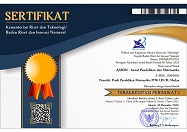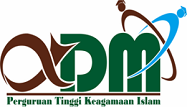KEMAMPUAN KOMUNIKASI MATEMATIS DITINJAU DARI KETERLIBATAN SISWA MELALUI PENDEKATAN REALISTIC MATHEMATICS EDUCATION (RME)
Abstract
Abstrak:
Tujuan penelitian ini adalah untuk mendeskripsikan kemampuan komunikasi matematis ditinjau dari keterlibatan siswa pada materi segiempat melalui pendekatan RME. Penelitian ini merupakan penelitian kualitatif. Subjek dalam penelitian ini adalah 6 orang siswa kelas VII-1 SMP IT AL-Azhar Banda Aceh yang dipilih berdasarkan banyaknya indikator keterlibatan yang dipenuhi. Teknik pengumpulan data yang digunakan dalam penelitian ini yaitu observasi keterlibatan siswa dan tes kemampuan komunikasi matematis yang telah divalidasi. Data dianalisis dengan melakukan reduksi data, penyajian data dan penarikan kesimpulan. Berdasarkan hasil penelitian maka dapat disimpulkan bahwa kemampuan komunikasi matematis ditinjau dari keterlibatan siswa melalui pendekatan RME sudah baik. Hal ini terlihat dari hasil pencapaian kemampuan komunikasi matematis yang ditinjau dari keterlibatan siswa terhadap 4 orang subjek sudah berada pada katagori baik, artinya subjek telah memperoleh pembelajaran dengan baik karena pada saat pembelajaran subjek terlibat aktif serta memiliki kemampuan komunikasi matematis yang baik. Penggunaan pendekatan RME juga membangkitkan semangat siswa agar terlibat dalam pembelajaran serta memperoleh kemampuan komunikasi matematis yang baik. Namun, terdapat dua subjek dengan keterlibatan serta kemampuan komunikasi matematis dalam pembelajaran yang masih rendah.
Kata Kunci:
Kemampuan Komunikasi Matematis, Keterlibatan Siswa, Pendekatan RME
Abstract:
The purpose of this research was to describe students' mathematical communication skills. They were observed based on students' involvement in studying quadrilateral through the Realistic Mathematics Education (RME). This research was a qualitative research. The subjects in this research were 6 students of class VII-1 Islamic Junior High School AL-Azhar Banda Aceh who were selected based on the number of certain indicators that were fulfilled. The data collection techniques used in this research were observation of students' involvement, and tests of mathematical communication skills. The instruments for data collection had been previously validated. The data were analyzed by doing data reduction, data presentation, and drawing conclusions. Based on the research results, it could be concluded that students' mathematical communication skills observed based on students' involvement in the learning quadrilateral through the RME approach were good. This could be seen from the achievement of 4 students who accomplished good chategory in mathematical communication skills. This showed that the subjects had learned well because at the time of learning, the students actively involved and accomplished good mathematical communication skills. Thus, the use of the RME approach also aroused students' enthusiasm to be involved in learning and acquired good mathematical communication skills. However, there were still two subjects with low involvement and mathematical communication skills.
Keywords:
Mathematical Communication Skills, Students' Involvement, RME Approach
Full Text:
PDF (Indonesian)References
Ansari, B.I. (2016). Komunikasi matematika, strategi berfikir dan manajemen belajar (konsep dan aplikasi). Banda Aceh: Pena.
Ansari, B. I., & Sulastri, R. (2018). Improving mathematical representation ability in solving word problems through the use of cognitive strategies: Orientation, organization, and elaboration. Journal of Physics: Conference Series, 1028(1), 1-8.
Susanto, Ahmad. (2013). Teori belajar dan pembelajaran di sekolah dasar. Jakarta: Kharisma Putra Utama.
Baroody. A.J. (1993). Problem solving, reasoning, and communicating. New York: Macmillan Publishing.
Bodovski K, & Farkas G. (2007). The roles of beginning knowledge, student engagement, and instruction. Mathematics Growth In Early Elementary School. Elem Sch J, 108(2), 115-130.
Gunuc, S. (2014). The relationships between student engagement and their academic achievement. International Journal on New Trends in Education and Their Implications, 5(4), 216-231.
Gravemeijer. K. P. E. (1994). Developing realistic mathematics education. Utrecht: Freudenthal Institute.
Johar, R., Patahuddin, S. M., & Widjaja, W. (2017). Linking pre-service teachers' questioning and students' strategies in solving contextual problems: a case study in indonesia and the netherlands. The Mathematics Enthusiast, 14(1), 101-128.
National Council of Teacher of Mathematics. (2000). Principles and standards for school mathematics. Reston: NCTM.
Ozkaya, A., & Karaca, S. Y. (2017). The effects of realistic mathematics education on students'achievements and attitudes in fifth grades mathematics courses. International Online Journal Of Education And Teaching, 4(2), 185-197.
Patahuddin, S. M., Puteri, I., Lowrie, T., Logan, T., & Rika, B. (2018). Capturing student mathematical engagement through differently enacted classroom practices: Applying a modification of watson's analytical tool. International Journal of Mathematical Education in Science and Technology, 49(3), 384-400.
Purniati, T. (2003). Matematik pembelajaran geometri berdasarkan tahap-tahap awal van hiele dalam upaya meningkatkan kemampuan komunikasi siswa SLTP. Tesis, Tidak Dipublikasikan. Universitas Pendidikan Indonesia.
Rahayu, Tika. (2010). Pendekatan RME terhadap peningkatan prestai belajar matematika siswa kelas 2 sd n penaruban I Purbalingga. Yogyakarta: UNY.
Veralita, L., Rohaeti, E.E., & Purwasih, R. (2018). Meningkatkan kemampuan komunikasi matematik dan kemandirian belajar siswa smp melalui pendekatan realistic mathematics education. AKSIOMA: Jurnal Matematika dan Pendidikan Matematika, 9(1), 113-123.
Salim, N.R., & Ayub, A.F.M. (2017). Relationship between mathematics statistics engagement and attitudes towards statistics among undergraduate students in malaysia. In AIP Conference Proceedings, 179(1). AIP Publishing.
Soedjadi, R. (2010). Kiat pendidikan matematika di Indonesia. Jakarta: Dirjen Dikti Depdikbud.
Tarigan, Daitin. (2006). Pembelajaran matematika realistik. Jakarta: Departemen Pendidikan Nasional.
Watson, A. (2007). The nature of participation afforded by tasks, questions and prompts in mathematics classroom. Res Math Educ, 9(1), 111-126.
Watson, A. & Mason, J. (2005). Mathematics as a constructive activity: Generating examples, Mahwah: Lawrence Erlbaum Associates.
Wijaya, A. (2012). Pendidikan matematika realistic suatu alternative pendekatan pembelajaran matematika. Yogyakarta: Graha Ilmu.
Yackel, E., Cobb, P., & Wood, T. (1991). Small-group interactions as a source of learning opportunities in second-grade mathematics. Journal for research in mathematics education, 22(5), 390-408.
Yuhaniz, M., Samsudin, N.S., Ismail, I., & Zaki, M.Z.M. (2018). student engagement, collaboration and critical thinking through a board game module in an architecture history class. IDEALOGY, 3(2), 215-223.
Zakaria, E. & Syamaun, M. (2017). The effect of realistic mathematics education approach on students' achievement and attitudes toward mathematics. Jurnal of Mathematics Education Trends and Research, 1, 32-40.
Afgani, J.D. & Sutawidjaja, A. (2011). Materi pokok pembelajaran matematika. Jakarta: Universitas Terbuka.
Umar, W. (2012). Membangun kemampuan komunikasi matematis dalam pembelajaran matematika. Infinity Jurnal Ilmiah Program Studi Matematika STKIP Siliwangi Bandung, 1(1), 1-9.
Trowler V. (2010). Student engagement literature review. The Higher Education Academic. Lancaster University: Department of Educational Research.
Newman, M. J. (2005). Problem-based learning: An introduction and overview of the key features of the approach. London: UTPress.
Sardiman. (2006). Interaksi dan motivasi belajar-mengajar. Jakarta: Raja Grafindo Persada.
Willms, J. D. (2003). Students engagement at school: A sense of belonging and participation result from PISA 2000. Organisation for Economic Cooperation and Development.
DOI: http://dx.doi.org/10.30821/axiom.v10i1.8825
Refbacks
- There are currently no refbacks.
Copyright (c) 2021 Lisa Ramadhani, Rahmah Johar, Bansu Irianto Ansari

This work is licensed under a Creative Commons Attribution-ShareAlike 4.0 International License.
p-ISSN: 2087-8249 | e-ISSN: 2580-0450
Indexed by:
AXIOM : Jurnal Pendidikan dan Matematika is licensed under a Creative Commons Attribution-ShareAlike 4.0 International License.











